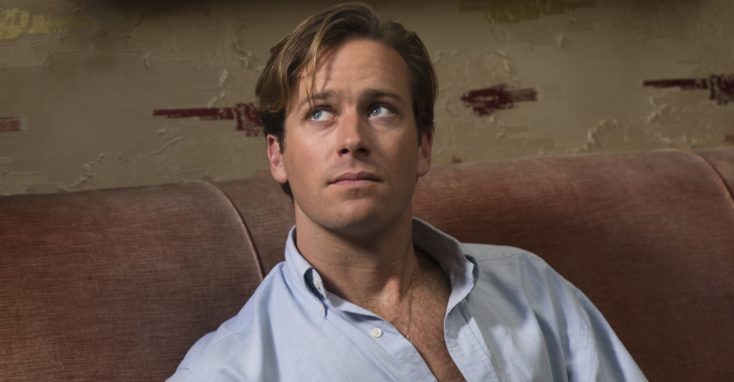By ANGELA DAWSON
Front Row Features
HOLLYWOOD—Armie Hammer knew it would be a challenge take on the role of 24-year-old grad student who has a passionate affair with the teenage son of the professor for whom he is interning in Luca Guadagnino’s adaptation of Andre Aciman’s acclaimed novel, “Call Me By Your Name.” Not because he is a straight guy typically cast in leading man heterosexual roles, but because he knew the success or failure of the romantic drama hinged on whether he and co-star Timothee Chalamet (“Interstellar:) delivered compelling and convincing performances.
“There were no distractions, no green screen, no special effects, no monsters, nothing to distract you at all,” said the tall, athletic actor who has starred in big screen blockbusters including “The Social Network” and “J. Edgar,” in which he and Leonardo DiCaprio shared a sex scene.
The 31-year-old Hammer, who is married to actress Elizabeth Chambers with whom he has two children, spoke about taking on the role of Oliver, the conflicted master’s candidate who futilely tries to resist his growing passion for 17-year old Elio (Chalamet), while staying at an Italian countryside villa with his family during the summer of 1983. Both pretend to court the opposite sex but eventually their undeniable mutual attraction prevails and they must deal with the consequences.
Q: Oliver’s elusive, especially at the beginning, and some of it is because he’s concerned about getting involved with the son of the man he’s working for, but also because it’s the early 1980s. Coming out would be scandalous for both Oliver and Elio. Could you talk about the moments leading up to when they reveal their feelings toward each other? Also, what was with Oliver’s signature dismissive farewell, “later?”
Hammer: I agree with you in that. I also think that, for me, that’s where the “later” comes from. It’s not said out of confidence like, “Well, I’m done with this conversation so I’ll see you later.” It’s much more to do with, “Whatever is going on inside of me and whatever is going on here makes me really uncomfortable. I’ve got to get out of here, so I’m out. Later.” Oliver can’t acknowledge or deal (with it), and it just percolates and percolates and percolates. You might be able to bury something like that inside of you, but you’re actually just burying a seed and it’s going to grow. That’s what happens, and it’s a wonderful progression of watching two human beings become more and more enthralled with each other, and finally feeling comfortable enough to open themselves up completely and say, “This is actually who I am,” and then having that emotion received and then reciprocated is such a wonderful thing that we all want, or have been lucky enough to experience and remember.
That’s why this movie connects with so many people, because regardless of your orientation or identification, you’ve felt those feelings before, of being totally incapacitated by this feeling of want and desire for another person, and then having that come to fruition and then maybe having it go away. Those are base human emotions that everybody’s dealt with, and that’s why a lot of people are connecting with the movie. That’s one of the masterful things that Luca (Guadagnino, the director) did.
Q: What was it like getting to know your character and what did you take away from it afterward?
Hammer: There’s a lot that I learned and there’s a lot to learn from a character like Oliver, both in the things that he does well and the things that you can look at objectively and say maybe he didn’t handle that as well as he could have, or maybe there was a different way that he would have taken if he was bolder or braver. He represents that thing in all of us—that duality of being a human. What you want and what you choose to go for are not always the same thing, and that can cause issues. He’s a beautifully complicated character who struggles with a lot of the turmoil and self-doubt that we all do, but he’s very good about covering it. There’s a lot to learn, both good and bad.
Q: This movie is filled with so many beautiful, tender moments, and you’re able to act out those moments at a leisurely pace. Could you comment on that slower pace versus making an action movie like “The Lone Ranger” or “The Man from U.N.C.L.E?”
Hammer: There’s one great example that people normally go to when they say that this movie just lets everything live, and it doesn’t rush anything along. It’s the scene where we’re riding bikes and we ride past the camera down this road, and we just keep riding, and we keep riding, and we keep riding, and you watch these two people who are really enjoying each other and the summer so much as they just disappear into it. If this film was made by a studio or if it was an American production, I think our sense of ADD would kick in and we’d be like, “All right, let them go for five seconds. Now, let’s go to the next shot.” As Luca has said, “everyone is a slave to enjoyment, so no one understands desire.” This movie really just took its time and let it grow and let it live in a way where it feels like you live a summer almost in real time.
Q: Online culture is huge and it doesn’t matter how good the performance is. If it’s not 100 percent accurate, people will ream it. One of the criticisms I see online is, why isn’t an openly queer actor playing this role? Did you have any apprehensions with that, or do you keep that kind of stuff out of your head?
Hammer: That was Luca’s call. This is his film. I was honored to be asked to do this. It seemed like an amazing challenge as an actor, not playing a character who is gay. I’ve done that before. That wasn’t any sort of hurdle that I had to personally overcome. That wasn’t a thing for me. The challenge that I knew in this movie was that it lived and died between the connection of the two characters. The only thing that this movie propelled itself on was the emotional moments between the characters. If those didn’t ring true and if those didn’t work, then the movie would not work.
It just seemed like a challenge for me as an actor to make myself that emotionally accessible and vulnerable. That was one of the things that I really credit Luca with—the fact that he saw that and was not going to let anybody fake anything. It was all about him dragging and pulling that honesty out of us.
Q: Since this movie is set in 1983, before people were addicted to ubiquitous modern communications technology, did you try to stay away from that while in production? How did you get into the mindset of a gay 24-year-old of that time? Did Luca play pop music of that era on set?
Hammer: We had a speaker in the part of the house where we’d hang out, and we’d go back and listen to music and just spend time hanging out, just with each other and enjoying each other’s company.
Sony Pictures Classics will release “Call Me By Your Name” Friday, Nov. 24 in New York and Los Angeles, and subsequently will roll out the film to other cities.





